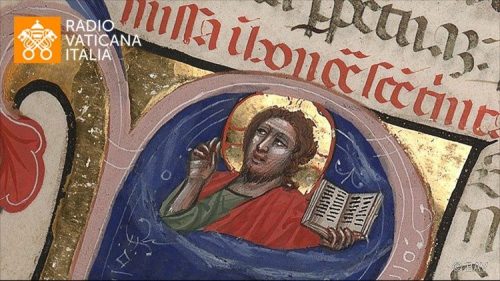READING OF THE DAY
READING 1
GN 2:18-24
The LORD God said: “It is not good for the man to be alone.
I will make a suitable partner for him.”
So the LORD God formed out of the ground
various wild animals and various birds of the air,
and he brought them to the man to see what he would call them;
whatever the man called each of them would be its name.
The man gave names to all the cattle,
all the birds of the air, and all wild animals;
but none proved to be the suitable partner for the man.So the LORD God cast a deep sleep on the man,
and while he was asleep,
he took out one of his ribs and closed up its place with flesh.
The LORD God then built up into a woman the rib
that he had taken from the man.
When he brought her to the man, the man said:
“This one, at last, is bone of my bones
and flesh of my flesh;
this one shall be called ‘woman, ‘
for out of ‘her man’ this one has been taken.”
That is why a man leaves his father and mother
and clings to his wife,
and the two of them become one flesh.READING 2
HEB 2:9-11
Brothers and sisters:
He “for a little while” was made “lower than the angels, ”
that by the grace of God he might taste death for everyone.For it was fitting that he,
for whom and through whom all things exist,
in bringing many children to glory,
should make the leader to their salvation perfect through suffering.
He who consecrates and those who are being consecrated
all have one origin.
Therefore, he is not ashamed to call them “brothers.”
GOSPEL OF THE DAY
MK 10:2-16
The Pharisees approached Jesus and asked,
“Is it lawful for a husband to divorce his wife?”
They were testing him.
He said to them in reply, “What did Moses command you?”
They replied,
“Moses permitted a husband to write a bill of divorce
and dismiss her.”
But Jesus told them,
“Because of the hardness of your hearts
he wrote you this commandment.
But from the beginning of creation, God made them male and female.
For this reason a man shall leave his father and mother
and be joined to his wife,
and the two shall become one flesh.
So they are no longer two but one flesh.
Therefore what God has joined together,
no human being must separate.”
In the house the disciples again questioned Jesus about this.
He said to them,
“Whoever divorces his wife and marries another
commits adultery against her;
and if she divorces her husband and marries another,
she commits adultery.”And people were bringing children to him that he might touch them,
but the disciples rebuked them.
When Jesus saw this he became indignant and said to them,
“Let the children come to me;
do not prevent them, for the kingdom of God belongs to
such as these.
Amen, I say to you,
whoever does not accept the kingdom of God like a child
will not enter it.”
Then he embraced them and blessed them,
placing his hands on them.
WORDS OF THE HOLY FATHER
Pope Francis reflected on the Gospel of the day from the evangelist Mark (10:1-2), in which the Pharisees, wishing to put Jesus to the test, ask him whether it is lawful to divorce. The Pope commented first on the reason why the doctors of the law sought to put Jesus to the test. “They saw the moral authority that Jesus had” and they felt this “as a reproof against themselves”. Thus, “they sought to make him fall in order to strip him of this moral authority”.
St Mark recounts that the Pharisees ask Jesus about “the question of divorce”, precisely “in order to test him”. And the problem is posed in their usual “style” of casuistry. The Pope noted that those who wished to entrap Jesus never set “an open issue” before him. Instead, they preferred to have recourse to “casuistry, to small cases” and to ask him: “Is this lawful or not?”
The desire to “trap” Jesus is inherent in this way of seeing things. “There is always a trap hidden behind casuistry, and behind casuistic thought, always!”, the Pope said. It is a trap set “for the people, for us and for God, always!”. The Pharisees asked: “Is it lawful for a man to divorce his wife?”. Jesus responds first by asking them “what the law says, and by explaining why Moses so established the law”.
However, the Lord does not end with this initial response, the Pope continued. He “goes from casuistry right to the heart of the problem”. In fact, “he goes right back to the days of creation” and refers to a “very beautiful” biblical passage contained in the Book of Genesis. Jesus says: “But from the beginning of creation, God made them male and female; ‘For this reason a man shall leave his father and mother and be joined to his wife, and the two shall become one. So they are no longer two but one flesh’”.
Pope Francis then reflected on this passage, explaining that “the Lord is here referring to the masterpiece of creation”. For God “created the light and saw that it was good”. Then “he created the animals, the trees, and the stars: all good”. But “when he created man” he said “that he was very good”. In fact, Pope Francis said, “the creation of man and woman is the masterpiece of creation”. Also because God “did not want for man to be alone: he wanted him to be with his companion, his companion on the journey”.
This moment was also “the beginning of love”, the Pope said. And the encounter of Adam and Eve was “very poetic”. God tells them to go forth together “as one flesh”. Hence, the Pope said, “the Lord always takes casuistic thought back to the beginning of Revelation”.
However, he added that “the Lord’s masterpiece was not finished there, during the days of creation”. For the Lord has chosen this very image “to explain the love that he has for his people, the love that he has with his people”. The Lord’s love is so great, that even “when his people are unfaithful”, still “he speaks to them words of love; we think of the way the Lord describes his unfaithful people in Chapter 16 of the prophet Ezekiel”. Thus, the Pope said, “the Lord holds up this love contained in the masterpiece of creation in order to explain the love he has for his people. Yet there is another step: when Paul needs to explain the mystery of Christ, he also does so in relation and in reference to the bride. For Christ is wedded: he wedded the Church, his people; as the Father had wedded his people Israel, so Christ espoused his people to himself”.
“This is the story of love. This is the story of the masterpiece of creation. And casuistry crumbles before this journey of love, before this icon, and becomes pain”. Pain in the face of failure. “When he leaves his father and mother to be joined to a woman, when they become one flesh and continue on, when this love fails — for it often fails — we need to feel the pain of the failure”, the Pope said. And in that moment we also need “to accompany those persons who have failed in their love”. We don’t need “to condemn” but “to walk with them”, and above all, we need not “turn their situation into casuistry”.
All of this, the Pope continued, brings to mind the “plan of love”, “the journey of love of Christian marriage, which God blessed in the masterpiece of his creation with a blessing that can never be taken away. Not even original sin destroyed it”. And “when one considers this”, he quite naturally sees “how beautiful love is, how beautiful marriage is, how beautiful the family is, how beautiful this journey is”. But he also sees “how much love, and what great closeness we should also have for our brothers and sisters who, in their lives, have had the misfortune of a failed love”. A love that “begins poetically, for the second account of the creation of man in the Book of Genesis is poetic”; and that “concludes poetically in the Bible, in the Letters of St Paul, when he speaks of the love that Christ has for his bride, the Church”.
The Pope emphasized, however, that “here also we need to take care that love does not fail” so that we end in “speaking about Christ as ‘a bachelor’: Christ married the Church! And we cannot understand Christ without the Church”, just as “we cannot understand the Church without Christ”. “This is the great mystery of the masterpiece of creation”.
Pope Francis concluded his meditation by asking the Lord for the grace to understand this mystery “and for the grace never to fall into the casuistic attitude of the Pharisees and doctors of the law”.
(Santa Marta, 28 February 2014)

